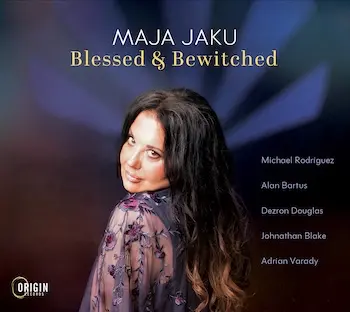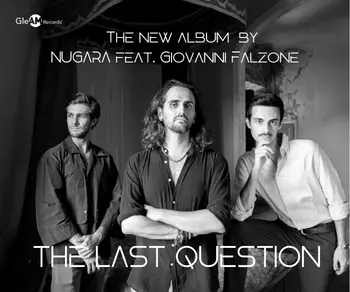Naissam Jalal: Souffles (Autre Distribution 238933 CD)
Here we have a series of duets between French-Syrian flautist and vocalist Naissam Jalal and a selection of horn players. The title comes from the verb “souffler”, to blow or to breathe. Chosen thoughtfully, there’s not only a range of sound from each, depending on the instrument used, but also in the character of their playing. What they do have in common is a richness of melodic harmonies, some approximating Middle Eastern music, others having elements of modern classical and improvisation, and at times a feel of incidental music, in the dramatic mood created.
The tracks are simply entitled Souffle (no acute accent) with a hashtag or octothorpe preceding the number, and although they go from one to nine, they aren’t in numerical order and number two is missing. Maybe that musician had contractual issues.
The flute and horn are in complete accord on each, some in unison and similarity of timbre, for example the tenor saxophone of Sylvain Rifflet (#4) or the sopranos of Irving Acao (#6) and Emile Parisian (#9), the latter almost moving into minimalism towards the end of the track.
Others have a clear contrast to Jalal’s flute, such as the deep resonance of Louis Sclavis’s bass clarinet (#7) and the rounded pulsating fullness of Robinson Khoury’s trombone (#8). Archie Shepp (#1) uses his tenor with accustomed edginess before sliding into soulful depths, a musical conversation with Jalal vocalising her notes. The track, and album, culminates with a wordless vocal duet between the two, a paean to the spirits.
It’s a lovely series of vignettes, calming, uplifting and beguiling.
Jan van Duikeren’s Fingerprint: Slow Your Roll (Zip Records ZIP426)
Dutch jazz has often fallen into two spheres of influence – either the traditional, following the Dutch Swing College Band or the more improvised forms that appeared in the late 60s, led by Misha Mengelberg, Han Bennink and others. Of course, nothing is that straightforward and many figures were overlooked, as seen in the Fresh Sounds collection, Cool Jazz From Holland (reviewed in August 2022).
One figure that has held the middle ground for some years is drummer John Engels, whose 90th birthday was recently celebrated at Amsterdam’s Bimhuis. Trumpeter Jan van Duikeren was involved in this tribute, as he has been associated with Engels for some time, even putting out an album dedicated to him, Dear John, in 2015.
Van Duikeren has performed with a wide range of artists, from the Bob Brookmeyer Big Band, Candy Dulfer and Joshua Redman to rock and soul outfits. His band Fingerprint started out some time back, putting out their debut album in 2011, and this latest release sees them firmly in what has been described as “groove-based modern jazz”.
Some of the tracks lean towards a melodic modal style (Slow Your Roll and ID.1), and here, as with the tracks where vocalists Lo Van Gorp and the Brazilian Lilian Vieira are added, it’s taken into the realms of smooth jazz. Others veer into funk, guided by drummer Salle De Jonge and bassist Hugo Den Oudsten.
The acclaimed guitarist Jesse Van Ruller appears on four numbers, his bluesy approach slotting in within the context of the material, and he’s featured on Hufflepuff Huffle and Lick & Run. Another guest is DJ Optimus (Neels Smeekens) whose “sounds + scratches” on Shack Jit are minimal, nothing intrusive.
There are brief occasions when saxophonist Tom Beek solos and Van Duikeren’s contributions are clear and concise and the two combine strongly on Shinjuku – but mostly these seem to get submerged in the mix. It’s a long way from the excitement and immediacy of the Shaffy Theatre and the earlier Bimhuis days. Disappointing.
MTB (Mehldau, Turner, Bernstein): Solid Jackson (Elemental 1423 LP)
The title of this album is apt if in the context of 1940s phraseology as a compliment of another’s playing. Solid meant things were good, in order, and Jack was a colloquialism amongst hipsters for a person generally and sometimes lengthened to Jackson. Vocalist Ollie Shepherd recorded Solid Jack in 1938 for Decca and Cab Calloway, in his Swingformation Bureau guide to jive language (1939), suggested the proper reply when invited to someone’s house was “Solid Jack, I’ll dig you in your den gradually.” It even entered the mainstream, to some extent, when the Brazilian musicians’ vocabulary in the Hope/Crosby film Road To Rio (1947) included “You’re in the groove, Jackson.” The Art Ensemble of Chicago later recorded A Jackson in Your House.
Nigel Jarrett covered the CD version of this album earlier in the year and there’s little to add to his comments. Maury’s Grey Wig is the standout track for me as well, although the languidity of Mobley’s Soft Impression runs it close.
For those of a vinyl inclination, this comes in a sturdy gatefold sleeve as a limited edition 180g audiophile pressing and the sound quality is excellent. The sleeve notes are by American journalist, writer and long-time Downbeat contributor Ted Panken, who goes into the background of the group from its inception to information about the tracks. Whilst he (rightly) mentions Ornette Coleman’s Blues Connotation in respect to the title track, I thought it had more of a feel of Ramblin’ in its approach. Either way, it gives you the idea of where it’s coming from, although here it’s more rounded, less angular than Coleman’s. The instrumentation affects it, especially the inclusion of guitarist Peter Bernstein, and like Wayne Shorter’s Angola, it has a softer edge than the version on The Soothsayer.
Marie Mørck: My One And Only Love (Zack’s Music MM2501CD)
Although Marie Mørck’s name is well known in Denmark, it’s less familiar here. Maybe it’s just a matter of time, as given her style and intimacy it would be easy to imagine her appearing at nightspots like London’s Crazy Coqs or The Pheasantry. She has a distinctive voice, light and airy with an element of Blossom Dearie in its youthfulness and poise. Her phrasing is good, with clear diction and she holds a note well.
She apparently composes much of her own work but here focuses on material from the American Songbook. Although the press release describes them as “reinterpretations”, she avoids the excesses that can come with this or with “reinvention”. They’re more or less a straight rendition without any superfluous or unnecessary appendages, but with occasional forays where some licence is given – a bit of scat thrown in here and there.
Her accompanying trio are faultless, with tasteful solos and some interesting arrangements, notably on My One And Only Love (very different to Johnny Hartman’s), and Look For The Silver Lining, which is taken slower than, for example, Chet Baker’s, and whereas the latter has Russ Freeman’s busy solo, pianist Magnus Hjorth is suitably more economical. The first solo on this, and on the whole album, is by bassist Lasse Mørck, which sets the tenor or essence of what follows.
Ignoring Are You Havin’ Any Fun, which I’ve always considered having more than a hint of irony, the rest of the tracks are classics. I’m In The Mood For Love, which became Frances Langford’s signature tune – and the inspiration for James Moody’s Moody’s Mood For Love – is included, as is Johnny Burke and Jimmy Van Heusen’s Like Someone In Love, which Dearie recorded in 1958 on her Give Him The Ooh La La album. Solid.




